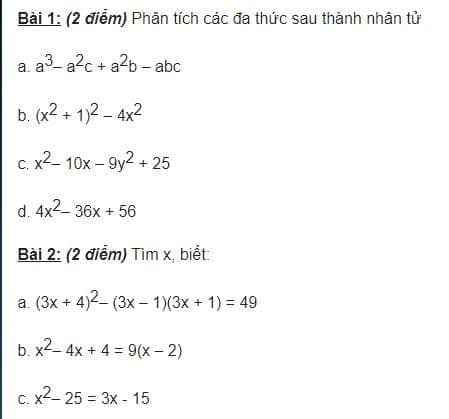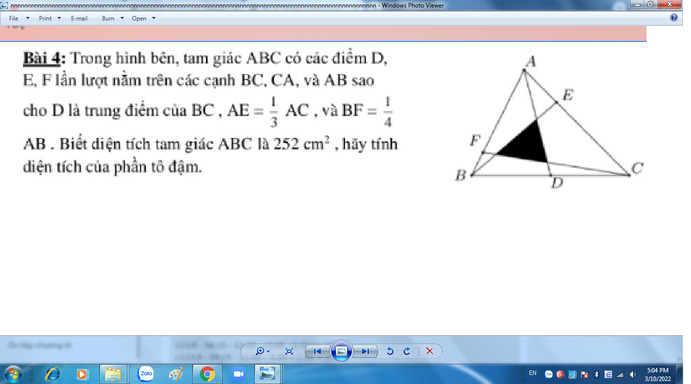
Hãy nhập câu hỏi của bạn vào đây, nếu là tài khoản VIP, bạn sẽ được ưu tiên trả lời.


Bài 1:
Vận tốc cano khi dòng nước lặng là: $25-2=23$ (km/h)
Bài 2:
Đổi 1 giờ 48 phút = 1,8 giờ
Độ dài quãng đường AB: $1,8\times 25=45$ (km)
Vận tốc ngược dòng là: $25-2,5-2,5=20$ (km/h)
Cano ngược dòng từ B về A hết:
$45:20=2,25$ giờ = 2 giờ 15 phút.


Bài 1:
a.
$a^3-a^2c+a^2b-abc=a^2(a-c)+ab(a-c)$
$=(a-c)(a^2+ab)=(a-c)a(a+b)=a(a-c)(a+b)$
b.
$(x^2+1)^2-4x^2=(x^2+1)^2-(2x)^2=(x^2+1-2x)(x^2+1+2x)$
$=(x-1)^2(x+1)^2$
c.
$x^2-10x-9y^2+25=(x^2-10x+25)-9y^2$
$=(x-5)^2-(3y)^2=(x-5-3y)(x-5+3y)$
d.
$4x^2-36x+56=4(x^2-9x+14)=4(x^2-2x-7x+14)$
$=4[x(x-2)-7(x-2)]=4(x-2)(x-7)$
Bài 2:
a. $(3x+4)^2-(3x-1)(3x+1)=49$
$\Leftrightarrow (3x+4)^2-[(3x)^2-1]=49$
$\Leftrightarrow (3x+4)^2-(3x)^2=48$
$\Leftrightarrow (3x+4-3x)(3x+4+3x)=48$
$\Leftrightarrow 4(6x+4)=48$
$\Leftrightarrow 6x+4=12$
$\Leftrightarrow 6x=8$
$\Leftrightarrow x=\frac{4}{3}$
b. $x^2-4x+4=9(x-2)$
$\Leftrightarrow (x-2)^2=9(x-2)$
$\Leftrightarrow (x-2)(x-2-9)=0$
$\Leftrightarrow (x-2)(x-11)=0$
$\Leftrightarrow x-2=0$ hoặc $x-11=0$
$\Leftrightarrow x=2$ hoặc $x=11$
c.
$x^2-25=3x-15$
$\Leftrightarrow (x-5)(x+5)=3(x-5)$
$\Leftrightarrow (x-5)(x+5-3)=0$
$\Leftrightarrow (x-5)(x+2)=0$
$\Leftrightarrow x-5=0$ hoặc $x+2=0$
$\Leftrightarrow x=5$ hoặc $x=-2$


Câu 4:
a: ĐKXĐ: \(x\notin\left\{0;-5\right\}\)
b: \(A=\dfrac{x^2+2x}{2\left(x+5\right)}+\dfrac{x-5}{x}+\dfrac{50-5x}{2x\left(x+5\right)}\)
\(=\dfrac{x^3+2x^2}{2x\left(x+5\right)}+\dfrac{2\left(x^2-25\right)}{2x\left(x+5\right)}+\dfrac{50-5x}{2x\left(x+5\right)}\)
\(=\dfrac{x^3+2x^2+2x^2-50+50-5x}{2x\left(x+5\right)}\)
\(=\dfrac{x^3+4x^2-5x}{2x\left(x+5\right)}=\dfrac{x\left(x^2+4x-5\right)}{2x\left(x+5\right)}\)
\(=\dfrac{x\left(x+5\right)\left(x-1\right)}{2x\left(x+5\right)}=\dfrac{x-1}{2}\)
c: Để A=-3 thì x-1=-6
hay x=-5(loại)

Điều kiện:
\(x-1\ne0\Rightarrow x\ne1\)
\(x^3+x\ne0\Leftrightarrow x\ne0\)

Kẽ BH vuông góc CD=>DH+HC=7=>HC=7-3=4 xét tam giác BHC có:
BHC+HCB+CBH=180o( tổng ba góc trong 1 tam giác)
CBH=180-90-45=45o
=> tam giác BHC là tam giác vuông cân
=> HC=BH=4cm
SABCD=SABHD+SBHC=\(3.4+\left(\frac{4.4}{2}\right)=20cm^2\)





 Mọi Người giải giúp em ạ em cảm ơn ạ
Mọi Người giải giúp em ạ em cảm ơn ạ 


 mọi người giải giúp em với ạ em đang cần gấp lắm ạ
mọi người giải giúp em với ạ em đang cần gấp lắm ạ 


 giúp mk nha mờn nhìu ạk
giúp mk nha mờn nhìu ạk





\(a,=8\left(x^2-2xy+y^2\right)=8\left(x-y\right)^2\\ b,=9\left(x^2-y^2\right)=9\left(x-y\right)\left(x+y\right)\\ c,=\left(x^2-y^2\right)-\left(9x+9y\right)\\ =\left(x-y\right)\left(x+y\right)-9\left(x+y\right)=\left(x+y\right)\left(x-y-9\right)\\ d,=3\left(x^2-4x+4-4y^2\right)=3\left[\left(x-2\right)^2-4y^2\right]\\ =3\left(x-2y-2\right)\left(x+2y-2\right)\\ e,=4x^2+4x+9x+9=4x\left(x+1\right)+9\left(x+1\right)\\ =\left(4x+9\right)\left(x+1\right)\\ f,Sai.đề\)
a) \(8x^2-16xy+8y^2=8\left(x^2-2xy+y^2\right)=8\left(x-y\right)^2\)
b) \(9x^2-9y^2=9\left(x^2-y^2\right)=9\left(x-y\right)\left(x+y\right)\)
c) \(x^2-9x-9y-y^2=\left(x^2-y^2\right)-\left(9x+9y\right)=\left(x-y\right)\left(x+y\right)-9\left(x+y\right)=\left(x+y\right)\left(x-y-9\right)\)
d) \(3x^2-12x+12-12y^2=3\left(x^2-4x+4-4y^2\right)=3\left[\left(x-2\right)^2-4y^2\right]=3\left(x-2-4y\right)\left(x-2+4y\right)\)
e) \(4x^2+13x+9=\left(4x^2+4x\right)+\left(9x+9\right)=4x\left(x+1\right)+9\left(x+1\right)=\left(x+1\right)\left(4x+9\right)\)